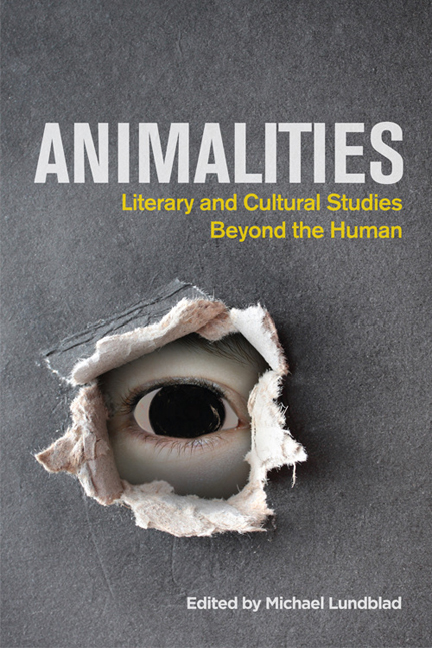Book contents
- Frontmatter
- Contents
- List of Figures
- Acknowledgments
- Introduction: The End of the Animal – Literary and Cultural Animalities
- 1 Each Time Unique: The Poetics of Extinction
- 2 Posthuman New York: Ground Zero of the Anthropocene
- 3 J. G. Ballard's Dark Ecologies: Unsettling Nature, Animals, and Literary Tropes
- 4 Staging Humanimality: Patricia Piccinini and a Genealogy of Species Intermingling
- 5 “Sparks Would Fly”: Electricity and the Spectacle of Animality
- 6 The Nature of Birds, Women, and Cancer: Terry Tempest Williams's Refuge and When Women Were Birds
- 7 Animality, Biopolitics, and Umwelt in Amitav Ghosh's The Hungry Tide
- 8 Looking the Beast in the Eye: Re-animating Meat in Nordic and British Food Culture
- 9 Love Triangle with Dog: Whym Chow, the “Michael Fields,” and the Poetic Potential of Human-Animal Bonds
- 10 Bestial Humans and Sexual Animals: Zoophilia in Law and Literature
- Notes on Contributors
- Index
2 - Posthuman New York: Ground Zero of the Anthropocene
Published online by Cambridge University Press: 07 December 2017
- Frontmatter
- Contents
- List of Figures
- Acknowledgments
- Introduction: The End of the Animal – Literary and Cultural Animalities
- 1 Each Time Unique: The Poetics of Extinction
- 2 Posthuman New York: Ground Zero of the Anthropocene
- 3 J. G. Ballard's Dark Ecologies: Unsettling Nature, Animals, and Literary Tropes
- 4 Staging Humanimality: Patricia Piccinini and a Genealogy of Species Intermingling
- 5 “Sparks Would Fly”: Electricity and the Spectacle of Animality
- 6 The Nature of Birds, Women, and Cancer: Terry Tempest Williams's Refuge and When Women Were Birds
- 7 Animality, Biopolitics, and Umwelt in Amitav Ghosh's The Hungry Tide
- 8 Looking the Beast in the Eye: Re-animating Meat in Nordic and British Food Culture
- 9 Love Triangle with Dog: Whym Chow, the “Michael Fields,” and the Poetic Potential of Human-Animal Bonds
- 10 Bestial Humans and Sexual Animals: Zoophilia in Law and Literature
- Notes on Contributors
- Index
Summary
Forget “homeland security.” Time itself has changed. We know catastrophes are coming, and we know they'll take us by surprise.
The figure of the environment shifts: from the harmony of a natural balance to a churning seed-bed of crisis in the perpetual making…. It expressed nothing so much as the normality of a generalized crisis environment so encompassing in its endemic threat-form as to connect, across the spectrum, the polar extremes of war and the weather.
The ground zero of extinction
In the decade following the attacks of 11 September 2001, a number of mass media images depicting the destruction of New York City displayed the vulnerability of human life not to the specter of terrorism, but instead to the violence of a planetary environmental catastrophe caused by carbon emissions. One of the zero decade's highest-grossing Hollywood films, Roland Emmerich's The Day After Tomorrow, envisions a climate-driven disruption of the Gulf Stream bringing a new ice age that engulfs New York – along with most of the temperate Global North – in a quick-freezing layer of permafrost. The film portrays the mass migration of the remaining human inhabitants of the United States southward across the Mexican border to warmer climes. In contrast to xenophobic narratives of a settler-colonial United States endangered and engulfed by immigrants and terrorists, the film envisions the New York cityscape as the site of the blowback of the imperial carbon economy. The North succumbs to the effects of its own carbon-fueled excesses, transforming U.S. settlers into climate refugees. Emmerich's film thus reflects how emergent forms of environmental speculation in visual culture create platforms for imagining how planetary environmental processes threaten to upend visions of modernity and humanity based on current geopolitical configurations of fossil fuel capitalism.
This chapter explores the politics of form, place, and animality in twenty-first century speculative images of climate disaster in New York and beyond. While popular speculations of climate disaster reflect a heightened political urgency that attempts to use visions of crisis to generate political affects that disrupt the ecological violence of the carbon economy, the emerging environmental speculations are also remarkable for the subtle ways in which they universalize human responsibility for climate disaster and mask violences of colonialism that created the settler landscapes they depict as vulnerable.
- Type
- Chapter
- Information
- AnimalitiesLiterary and Cultural Studies Beyond the Human, pp. 43 - 59Publisher: Edinburgh University PressPrint publication year: 2017



